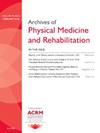Evaluating the Feasibility and Acceptability of a Tailored Multicomponent Rehabilitation Program for Adolescent and Young Adult (AYA) Cancer Survivors 8267
IF 3.6
2区 医学
Q1 REHABILITATION
Archives of physical medicine and rehabilitation
Pub Date : 2025-04-01
DOI:10.1016/j.apmr.2025.01.044
引用次数: 0
Abstract
Objectives
To: (1) assess the feasibility, acceptability, and safety of CaRE-AYA and (2) obtain preliminary estimates of variability in clinical outcomes including disability, physical and social functioning, and mental health by adapting an existing evidence-based multidimensional cancer rehabilitation to address the needs of adolescent and young adult (AYA) cancer survivors (CaRE-AYA) and conducting a phase 1 study.
Design
Single-arm, explanatory sequential multimethods study conducted at Princess Margaret Cancer Centre.
Setting
AYA patients could be referred to the CaRE-AYA program from the Cancer Rehabilitation and Survivorship Program at Princess Margaret Cancer Centre.
Participants
AYA cancer survivors (aged 18-39y) who were treated for cancer at Princess Margaret Cancer Centre and were experiencing moderate to high levels of disability or treatment effects could be referred to CaRE-AYA.
Interventions
CaRE-AYA is an 8-week group program that includes individualized exercise prescribed by a registered Kinesiologist and weekly in-person group-based exercise and self-management skills education.
Main Outcome Measures
Feasibility outcomes include participation and retention rates, and program adherence. Acceptability is being assessed through surveys and qualitative interviews with a subset of participants. Clinical outcome data are collected before (T0) and after (immediate [T1] and 3-month [T2]) intervention through questionnaires and physiological assessments. Any adverse events resulting from the study were reported and evaluated on the CTCAE version 5.
Results
Four CaRE-AYA groups were delivered and 26 AYAs enrolled and provided consent (63%) (age, 33.2±5.5y), and 21 (81%) completed the program. Adherence was 80% to the exercise classes and education classes. Participants reported high satisfaction with the program; 100% rated the material as important and relevant to AYA survivors. Suggestions for improvements has included later start time, more interactive components, and modifications to the educational content. Interviews, qualitative analysis, and 3-month clinical outcome data collection for group 4 participants (n=11) are still underway. There were no adverse events resulting from the study procedure, therefore confirming the safety of the intervention. Preliminary T0 to T1 data suggest important improvements on the 6 minute walk test, grip strength, physical functioning (SF-36), disability (WHODAS), mental health outcomes (GAD-7), and social functioning (SDI).
Conclusions
Preliminary data suggests the CaRE-AYA program is feasible, acceptable, and safe. Updated T2 data will be presented.
Disclosures
none.
评估青少年和年轻成人(AYA)癌症幸存者量身定制的多组分康复计划的可行性和可接受性[j]
目的:(1)评估CaRE-AYA的可行性、可接受性和安全性;(2)通过调整现有的基于证据的多维癌症康复来满足青少年和年轻成人(AYA)癌症幸存者(CaRE-AYA)的需求,并开展一项1期研究,初步估计包括残疾、身体和社会功能以及心理健康在内的临床结果的可变性。设计:在玛格丽特公主癌症中心进行的单臂、解释性序贯多方法研究。设置aya患者可以从玛格丽特公主癌症中心的癌症康复和生存计划转介到CaRE-AYA计划。在玛格丽特公主癌症中心接受癌症治疗并经历中度至高度残疾或治疗效果的参与者(18-39岁)的saya癌症幸存者可以转介到CaRE-AYA。interonscare - aya是一项为期8周的团体计划,包括由注册运动学家规定的个性化锻炼,每周面对面的团体锻炼和自我管理技能教育。可行性结果包括参与率和保留率,以及项目遵守情况。通过对一部分参与者的调查和定性访谈来评估可接受性。通过问卷调查和生理评估收集干预前(T0)和干预后(即刻[T1]和3个月[T2])的临床结局数据。在CTCAE第5版中报告和评估了研究引起的任何不良事件。结果共交付4组CaRE-AYA, 26例aya入组并提供同意(63%)(年龄:33.2±5.5岁),21例(81%)完成治疗。80%的人坚持参加运动课程和教育课程。参与者对该计划的满意度很高;100%认为这些材料对阿雅幸存者来说是重要和相关的。改进建议包括推迟开始时间、增加交互式组件和修改教育内容。4组参与者(n=11)的访谈、定性分析和3个月临床结果数据收集仍在进行中。研究过程中没有出现不良事件,因此证实了干预的安全性。T0至T1的初步数据显示,6分钟步行测试、握力、身体功能(SF-36)、残疾(WHODAS)、精神健康结果(GAD-7)和社会功能(SDI)有重要改善。结论初步数据表明CaRE-AYA方案是可行的、可接受的、安全的。将提交更新的T2数据。
本文章由计算机程序翻译,如有差异,请以英文原文为准。
求助全文
约1分钟内获得全文
求助全文
来源期刊
CiteScore
6.20
自引率
4.70%
发文量
495
审稿时长
38 days
期刊介绍:
The Archives of Physical Medicine and Rehabilitation publishes original, peer-reviewed research and clinical reports on important trends and developments in physical medicine and rehabilitation and related fields. This international journal brings researchers and clinicians authoritative information on the therapeutic utilization of physical, behavioral and pharmaceutical agents in providing comprehensive care for individuals with chronic illness and disabilities.
Archives began publication in 1920, publishes monthly, and is the official journal of the American Congress of Rehabilitation Medicine. Its papers are cited more often than any other rehabilitation journal.

 求助内容:
求助内容: 应助结果提醒方式:
应助结果提醒方式:


